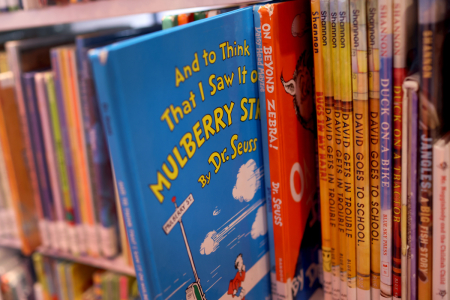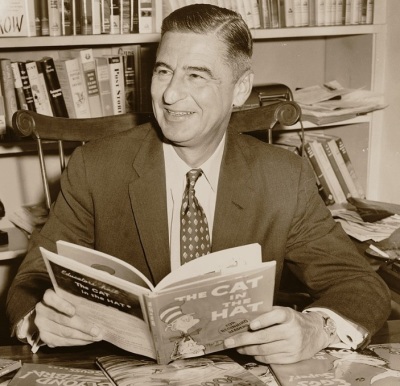Christians respond after 6 Dr. Seuss books were 'canceled' for 'hurtful' portrayal

As conservatives voice outrage after six Dr. Seuss books were “canceled” over insensitive imagery, a culture and policy analyst with a leading conservative Christian family organization believes Christians should acknowledge some of Seuss’ work was problematic without demonizing him.
Focus on the Family’s Jeff Johnston told The Christian Post in an interview Wednesday that Christians should be objective in their approach to “knee-jerk reaction” issues that gain so much attention.
“As Christians, we want to be temperate in issues like this, and objective and not rush to judgment about Dr. Seuss or about any of his work,” Johnston said. “And it’s also important to have some perspective on this. Dr. Seuss was a product of his own time. … Christians should be honest, too, that there are some aspects of his work that are problematic. … But at the same time, I don’t think we want to demonize Dr. Seuss.”

In the statement released Tuesday, Dr. Seuss Enterprises announced that it made “the decision last year to cease publication and licensing” on titles such as And to Think That I Saw It on Mulberry Street, If I Ran the Zoo, McElligot’s Pool, On Beyond Zebra!, Scrambled Eggs Super! and The Cat’s Quizzer. The decision came after a panel of experts and educators reviewed the Dr. Seuss catalog.
“These books portray people in ways that are hurtful and wrong,” the statement reads. “Ceasing sales of these books is only part of our commitment and our broader plan to ensure Dr. Seuss Enterprises’s catalog represents and supports all communities and families.”
In the White House’s proclamation for “Read Across America Day,” which is on Dr. Seuss’ birthday, is traditionally associated with Seuss, the Biden administration failed to mention the author.
The books face criticism for their portrayal of Asian and black people, according to NPR.
Johnston said it is important to recognize the context of these books and is concerned with how quickly problematic content can be erased.
“I’m a parent, and I’m also a former English teacher, so I am concerned that in some ways, it feels like we’re destroying our own history by the knee-jerk reaction to yank books and pull them out,” Johnston said. “I just think we want to be careful and rush to judgment. … We need to be careful not to demonize people, but also to use material that is problematic to teach people, especially to teach our children.”
Dr. Seuss’ stepdaughter told The New York Post that she hopes the six banned books will return to print “because his body of work is unique." But she said she thinks the decision was "wise."
“There wasn’t a racist bone in that man’s body — he was so acutely aware of the world around him and cared so much,’’ Lark Grey Dimond-Cates said regarding her step-dad, whose legal name was Theodor Seuss Geisel.
In Seuss’ life, Johnston said he took steps to change some of his illustrations that could be misconstrued as stereotypical. He also created cartoons against racism.
“So, we want to take a balanced approach from people of history,” Johnston said. “Like most people, he was complicated. He also produced cartoons fighting racism and anti-Semitism. … He seemed to change and grow just like most of us want to do. You can’t deny the good that he did over the years.”
Johnston also noted how in Seuss’ book about the Sneetches, he teaches to accept all, regardless of appearance.
The decision to cease the publication of several of Seuss’ books has received backlash from Christian and conservative figures.
Fox News’s Tucker Carlson devoted part of his Tuesday night show to discuss the Dr. Seuss news. He told viewers, “if we lose this battle, America is lost.”
Carlson also cited Seuss’ story about “Sneetches” that teaches children there is no difference between a star-bellied or plain-bellied sneetch. He described the story as a “plea for color-blindness.”
"Dr. Seuss was not a racist," Carlson said. "He was an evangelist against bigotry. He wrote an entire shelf of books against racism, and not in a subtle way. They were clearly, explicitly, against racism. That was the whole point of writing them, to teach children not to be racist."
Sen. Marco Rubio, R-Fla., also weighed in on the cancelation controversy and tweeted, “Now 6 Dr. Seuss books are canceled too? When history looks back at this time it will be held up as an example of a depraved sociopolitical purge driven by hysteria and lunacy.”
Retired NFL tight end and an outspoken Christian, Benjamin Watson, who has written a book about race, tweeted Wednesday that “Dr. Seuss was not just a product of his time.”
“He and others made the time what it was,” Watson wrote. “But be mature enough to celebrate and enjoy his literary work while acknowledging that parts of it that are derogatory have no place. Everyone is harmed when stereotypes are normalized.”
Some of the banned Dr. Seuss books are already selling for hundreds of dollars online.
Criticism of Dr. Seuss’ literature is nothing new. In September 2017, former first lady Melania Trump gifted a collection of 10 Dr. Seuss books to high-achieving schools across the country in honor of National Read a Book Day.
In response to the gift, an elementary school librarian in Massachusetts rejected the offer and said her school did not need the books.
In a letter posted on The Horn Book directed to the first lady, elementary school librarian Liz Phipps Soeiro wrote, “You may not be aware of this, but Dr. Seuss is a bit of a cliche, a tired and worn ambassador for children’s literature… Another fact that many people are unaware of is that Dr. Seuss’ illustrations are steeped in racist propaganda, caricatures, and harmful stereotypes.”
The beloved children’s author, who wrote under the pseudonym, wrote over 60 books and is known for writing and illustrating bestselling literature such as The Cat in the Hat, Oh, the Places You’ll Go, Green Eggs and Ham and How the Grinch Stole Christmas. Many of his books are now popular movies.
Johnston said with controversial issues like this, it is important for Christians to have a different approach and respond with grace in light of the Gospel.
“We do have to remember we can’t throw out good work just because some people did some bad things in their past,” Johnston shared. “I think for Christians, our message is different from the rest of the world when we encounter things that are wrong or problematic. We don’t want to be so quick to judge people, whether it’s ‘how could he write that?’ or ‘how could they cancel Dr. Seuss?.'"
"But we want to look at things objectively, and it’s always important for Christians to bring up forgiveness and grace that we have a better way of dealing with some of these problems," he added. "We can point to the Gospel, which says that we can have reconciliation with God and with other people with Jesus Christ. … We want to point to something better.”





















